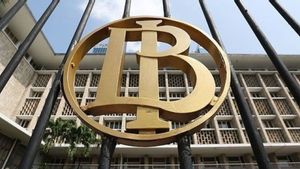
JAKARTA - Executive Director of the Indonesian Center of Reform on Economic (CORE) Mohammad Faisal asked the Financial Services Authority (OJK) to conduct an investigation regarding Bank BNI which is suspected of providing trillions of rupiah in loans to coal company BG without collateral in South Sumatra.
According to him, if there is a bank that disburses credit without any collateral, it has violated the prudential banking principle and has violated a principle.
"So I think that the OJK as the financial authority that oversees the financial sector, including the banking sector, should investigate and ensure this is in accordance with the precautionary principle," Faisal told reporters in Jakarta, Monday, June 6.
Faisal emphasized that a state-owned bank should have a fairly prudent assessment when it wants to channel credit to debtors.
"Because basically this bank saves public funds, so public funds must be managed professionally and must be really prudent and in the sense of adhering to the precautionary principle," said Faisal.
This, he said, is the reason why if you want to ask for credit from a bank there must be conditions, including one of them is collateral. There are also other requirements such as financial bookkeeping, administration and others.
Regarding credit distribution by Bank BNI, he hopes that there will not be a conflict of interest that could have an impact later if it is not feasible and then the credit is problematic.
"Well, this will have an impact later on financial cashflow at BNI which keeps public funds. So that really needs to be investigated," he said.
Meanwhile, Deputy Chairperson of the DPR RI State Financial Accountability Agency (BAKN), Anis Byarwati, said that if this issue was true, it would certainly be against the collateral principle. According to members of Commission XI of the DPR RI, this collateral is very important as a second way-out if the debtor is in default and psychologically becomes a binder of the debtor's seriousness in running a business and paying his credit obligations.
"In my opinion, banks as lenders must still measure the creditworthiness of prospective debtors with the 6C principles, namely Character, Capacity/Cashflow, Capital, Conditions, Collateral and Constraint. " said Anis quoted from Parliament.
So that if there is an abuse of authority or rules, several articles can be imposed, both banking regulations, OJK and other regulations. When bad loans can harm the state's finances, legal instruments will be used to solve these problems.
Likewise, Law Expert at Al-Azhar University Indonesia (UAI) Prof. Suparji Ahmad assessed that the statement from BAKN DPR RI reminded the banking business world to continue to run their business in accordance with prudent principles and also banking management that prioritizes good risk management.
He also agreed, if there is a potential for abuse of authority and bad credit (default) can be resolved through the applicable rules or regulations, both the Banking Law, OJK and other regulations including the Anti-Corruption Law if there is a potential for state financial losses.
According to him, without collateral or without collateral, there is a risk of risk of failure and loan repayment and potentially bad credit.
"Because the guarantee is only based on the provisions of general guarantees (Article 1131 of the Civil Code) and the position of the bank as a concurrent creditor," said Suparji.
If there is a default, then to recover the loss through a lawsuit to the court which is at risk of being ineffective and inefficient.
"Whereas if the debtor's assets must be divided with creditors, others must be divided pari pasu in accordance with the provisions of Article 1132 of the Civil Code," he continued.
In addition, the potential for corruption in these transactions such as the possibility of a conflict of interest and the potential for bribery or acts that enrich oneself and or others that can harm state finances.
Because according to him, collateral is used as a means for additional collateral, in addition to the previously attached general guarantee (Article 1131 of the Civil Code). He said that the existence of this guarantee or collateral is a means of fulfilling risk management from the bank if in the future there is an 'in order to control loan risk, bank often required collateral.'
He said that with material guarantees, banks could recover their losses from potential defaults without having to go through a lawsuit in court. That is because it has material rights that provide executorial rights through the auction of collateral objects.
"With credit guarantees, the banking business becomes effective and efficient and ensures smooth running of the national economy," he added.
The English, Chinese, Japanese, Arabic, and French versions are automatically generated by the AI. So there may still be inaccuracies in translating, please always see Indonesian as our main language. (system supported by DigitalSiber.id)












